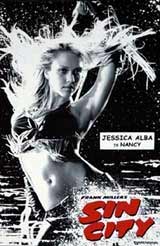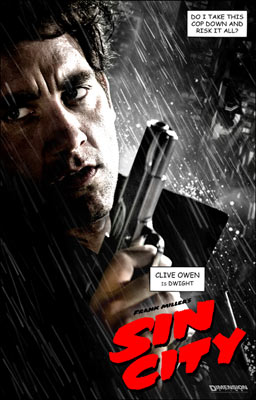Beaten to a Pulp: "Sin City"
 A common complaint about comic book movies -- that is, the movies actually based on comic books, as opposed to comic-book movies in general -- is that they aren't, well, "comic book" enough. Where is the economy of the storytelling? The relentless momentum contained within those freeze-framed panels? Recent extravaganzas such as Spider-Man and the X-Men films have done a creditable job of translating those thought balloons and zippy scene transitions into a more elegant cinematic vocabulary, but no one has ever attempted a straight-to-celluloid (or hard drive, as the case may be) upload of the complete comic book aesthetic, all moody poses, goofy dialogue, and crash test dummy pacing.
A common complaint about comic book movies -- that is, the movies actually based on comic books, as opposed to comic-book movies in general -- is that they aren't, well, "comic book" enough. Where is the economy of the storytelling? The relentless momentum contained within those freeze-framed panels? Recent extravaganzas such as Spider-Man and the X-Men films have done a creditable job of translating those thought balloons and zippy scene transitions into a more elegant cinematic vocabulary, but no one has ever attempted a straight-to-celluloid (or hard drive, as the case may be) upload of the complete comic book aesthetic, all moody poses, goofy dialogue, and crash test dummy pacing.Until now -- "Frank Miller's Sin City" (it's telling that the original author's name is so prominent in the credits) is the fin de siecle of comic book movies. The circle is complete: It was Miller's mid-80s classic "Dark Knight Returns," and its cynical update of the Batman saga, which inspired the first Batman movie (1989) and nearly every revisionist superhero tale since then. "Sin City" has lower aims in mind -- drawing a bead on the simian brain center, it celebrates the male capacity for violence and revenge, not to mention the instinct to protect the female of the species, or something squishy like that, set in a noir world that would have sent Philip Marlowe scurrying off, crying like a baby.
But back to comics. "Sin City" is a landmark of construction, with each frame lovingly transposed from the original source, each line of hardboiled cheese dialogue and narration slavishly copied, every ghoulish bit of gore replicated for maximum shock effect. It was inevitable that Robert Rodriguez, he of the Road Runner-violence of Desperado and the light-hearted digital natterings of the Spy Kids series, would be the person to bring this unholy brew to the screen.
And it's actually pretty entertaining -- miles better than the dead-on-arrival Sky Captain and the World of Tomorrow, which also set itself within a completely digitized world. Here, the deliberately stylized black-and-white photography and noirish backdrop anchor the story rather than overwhelming it, and Rodriguez is nothing if not a master editor, hurtling this machine down the road with the touch of a pro race car driver -- terror on the straightaways, easy and subtle on the curves.
 Ah yes, curves. Virtually every woman in this flick (with the exceptions of Jessica Alba, out of her depth as the stripper with the heart of gold, and Alexis Biedel as a femme fatale of the kiddy sort) gets to show them off. "Sin City" is proud to have its sleazy cake and eat it too, with Old Testament comeuppances, geysers of blood and severed limbs (all served up in classy whites and blacks), cannibalism, castrations, chicks bristling with guns and swords and breasts, several canned hams' worth of noir bon mots, and heads dunked in toilets. For those who claim this is the End of Days when it comes to cinematic morality, it should be added that none of this nonsense can really be taken seriously -- not even on the same semi-serious level as a Quentin Tarantino potboiler such as Kill Bill. Speaking of Tarantino, he directs the film's most memorable passage, a color-coded, hallucinatory conversation between a murderer/private eye (Clive Owen) with a reconstructed face and a dirty cop with a knife sticking out of his head (Benecio Del Toro). It's that kind of movie.
Ah yes, curves. Virtually every woman in this flick (with the exceptions of Jessica Alba, out of her depth as the stripper with the heart of gold, and Alexis Biedel as a femme fatale of the kiddy sort) gets to show them off. "Sin City" is proud to have its sleazy cake and eat it too, with Old Testament comeuppances, geysers of blood and severed limbs (all served up in classy whites and blacks), cannibalism, castrations, chicks bristling with guns and swords and breasts, several canned hams' worth of noir bon mots, and heads dunked in toilets. For those who claim this is the End of Days when it comes to cinematic morality, it should be added that none of this nonsense can really be taken seriously -- not even on the same semi-serious level as a Quentin Tarantino potboiler such as Kill Bill. Speaking of Tarantino, he directs the film's most memorable passage, a color-coded, hallucinatory conversation between a murderer/private eye (Clive Owen) with a reconstructed face and a dirty cop with a knife sticking out of his head (Benecio Del Toro). It's that kind of movie."Sin City" is based on three episodes from the comic series, and none of the stories withstand much scrutiny. All involve men on testosterone overdrive, protecting soiled hookers or angelic hookers, take your pick. In this universe, the dunking of a head into a toilet is the equivalent of thematic depth. Naturally, the cops are corrupt, the priests and politicians even worse, and the body count not so much an inevitability as a mandate. The first story, "The Hard Goodbye," comes off the best, as Mickey Rourke, nearly unidentifiable under mounds of makeup, but slurring his words like finely graded sandpaper, walks away with the film as Marv, the avenging lug with Energizer Rabbit endurance -- shoot him, run him over, stab him, electrocute him, and he'll still taunt, "Is that the best you've got, ya pansies?" As Marv's search for the murderer of his prostitute girlfriend swerves him into the path of a vengeful twin sister (Jaime King, all red lips and blond hair), a well-armed dyke (luscious Carla Gugino), a cannibal dressed in a Charlie Brown sweater (Elijah Wood going all Gollum), and finally a depraved cardinal, natch (scenery-chewing Rutger Hauer), Rourke's dry-as-twig line readings and absurd jutting chin add just the right bit of levity to this nasty business. It's easily Rourke's best role since "Angel Heart," and a career-reviving performance.
By the second segment, "The Big Fat Kill," which centers on Owen and his attempts to safeguard the prostitutes of Old Town against the slavering cops who want to overrun them, inertia begins to set in. Owen flashes a bit of roguish charm despite his nasal attempt at an American accent, and del Toro remains one of our most entertaining actors when it comes to going apeshit, but by the time the episode ends in a rhapsodic flash of gunfire, and Owen succumbs to the charms of steel-belted Rosario Dawson, genuflecting about his "Valkyrie" even as they romantically blast everything in sight, you begin to suspect that somehow this is all intended to mean something about tough guys and the tough women they protect (or vice versa), something a bit too squishy for the confines of a noir caper on steroids.
Ultimately what halts "Sin City" short of greatness is grim-faced hooey like this -- taken as individual episodes, perhaps as a TV series from Hell (listening, HBO?), these stories would be bracing in whiskey shot-sized doses, but jammed together back to back, they all bleed into each other, and despite Rodriguez's virtuoso direction, there's only so many ways you can show someone's balls getting shot off. By the time the movie winds down with the third tale, Bruce Willis playing an impossibly fit retired cop with a "bum ticker," taking on the aptly named "Yellow Bastard" (Nick Stahl, looking like Elmer Fudd reenvisioned by Harry Crumb) to rescue fair damsel Alba, you'll be forgetting what's happening as quickly as it's unfolding on screen. The Village Voice slams "Sin City" as "embalming" Miller's original work, but that's shortchanging Rodriguez's brutal grace with lights, shadows, and camera movement -- if the film needed anything, it's a story editor who would have been a little tougher on Frank Miller's original material -- in other words, someone other than Frank Miller.
Ultimately, perhaps "Sin City," with its graphic highs and lows, should be viewed as a signpost rather than an end point -- it remains to be seen whether a more "comic book" movie could possibly be made, at least in the literalized sense, but for those feeling that moral queasiness when witnessing the carnage, I suspect we ain't seen nothin' yet.


0 Comments:
Post a Comment
<< Home